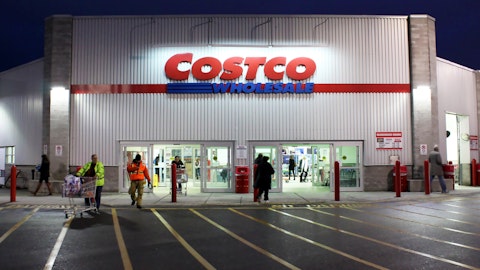A study conducted by PricewaterhouseCoopers LLP, released in 2014, concluded that retail was the main pillar of growth for the U.S. economy. According to the somewhat outdated study, retail was the largest private employer in the nation as the sector supported directly or indirectly roughly 42 million jobs. Although these figures might have changed slightly in the past several years, retail continues to power the American economy. Economists and investors usually closely monitor retail sales to get an idea about the health of the U.S. economy and about changes in consumer sentiment. However, as individuals are spending a higher share of their disposable income on services at the expense of goods, the performance of department stores no longer serves as a strong barometer for consumer spending and the overall health of the world’s largest economy. Just recently, Commerce Department data showed a 1.3% increase in April retail sales from a month earlier, so the U.S. economy is regaining momentum after a sluggish growth in the first quarter. That being said, we compiled a list of five retailers favored by funds managed or founded by billionaire investors from our database.
Through extensive research, we determined that imitating some of the picks of hedge funds and other institutional investors can help generate market-beating returns over the long run. The key is to focus on the small-cap picks of these investors, since they are usually less followed by the broader market and are less price-efficient. Our backtests that covered the period between 1999 and 2012, showed that following the 15 most popular small-caps among hedge funds can help a retail investor beat the market by an average of 95 basis points per month (see more details here).
![Walmart-WMT-retail-750x563[1]](https://imonkey-blog.imgix.net/blog/wp-content/uploads/2015/10/16115716/Walmart-WMT-retail-750x5631-750x563.png?auto=format&fit=clip&expires=1803513600&width=480&height=360)
#5. Kohl’s Corporation (NYSE:KSS)
– Billionaires with long positions as of March 31: 6
– Aggregate value of billionaires’ holdings as of March 31: $178.08 Million
The number of billionaire asset managers followed by Insider Monkey with equity investments in Kohl’s Corporation (NYSE:KSS) increased to six from four during the March quarter, while the overall value of those investments rose by 7% quarter-over-quarter to $178.08 million even though Kohl’s shares inched down by 1% during the same period. Online shopping has reshaped the retail industry quite significantly in recent years, as consumers are increasingly gravitating toward buying more items online. Department store chain Kohl’s appears to be a victim of the aforementioned trend, as its first-quarter net sales decreased 3.7% year-on-year to $4.0 billion. More importantly, the company’s first-quarter earnings declined a significant 50% year-over-year to $0.31 per share due to pricing reductions to clear excess inventory. Kohn’s paid shareholders a cash dividend of $0.50 per share in the first quarter of 2016, which equates to an impressive (but risky) annual dividend yield of 5.8%. Kohl’s shares are down 27% year-to-date. David Harding’s Winton Capital Management was the owner of 1.27 million shares of Kohl’s Corporation (NYSE:KSS) at the end of the first quarter.
Follow Kohls Corp (NYSE:KSS)
Follow Kohls Corp (NYSE:KSS)
Receive real-time insider trading and news alerts
Read on to see the other four retailers that billionaires are betting on, according to the latest round of 13F filings.




